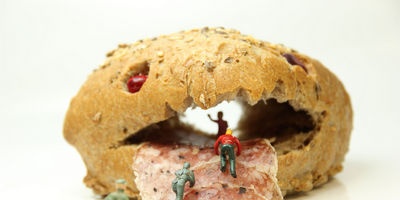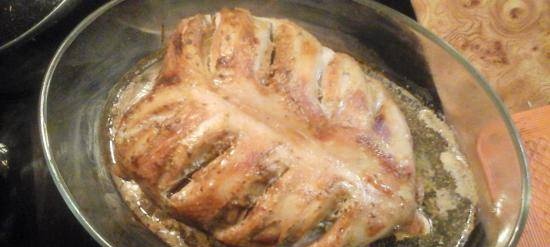|
 The ability to eat right and eat really healthy can and should be learned. And this is not so difficult to do. The ability to eat right and eat really healthy can and should be learned. And this is not so difficult to do.
First of all, let's try to figure out why there are still so many violations and mistakes in our diet.
Our research shows that people eat the wrong food, not only because they know little or poorly, but also because they do not have sufficient conviction in the exceptional importance of nutrition, that is, motivation of behavior, and as a result, there is no volitional decision to do the right thing.
Many, for example, underestimate the role of nutrition and its effect on health, performance and other aspects of the body's life. In their opinion, the harm to humans from eating disorders is unreasonably exaggerated. If some admit that unhealthy nutrition causes "certain" harm, then either in relation to others, considering themselves personally invulnerable for some reason, or they reason something like this: "Let me live 10-15 years less, but I will eat for pleasure".
Some recognize the important influence of nutrition on various aspects of the body's life and health. They admit ... and eat irrationally, because they consider it right to rely only on their tastes and habits in nutrition, so to speak, on the demands of "nature". The body itself, in their opinion, will tell with the help of appetite when, what and how much to eat. In addition, as Professor OP Molchanova rightly notes, it is often believed that food is no longer a problem for a well-off person. This is a big mistake. However, such a "approach" to nutrition, unfortunately, is still not uncommon.
Especially large, however, are the number of people who attach great importance to nutrition and often have even considerable (admittedly unsystematic) knowledge in these matters, but do not have sufficient willpower to comply with the requirements known to them. This is exactly what most people who are overweight or tend to overweight do. They cannot give up their addiction to the abuse of their favorite food (flour dishes, sweets, delicacies), from the habit of always chewing something, etc.
Of course, these "positions" are wrong. And in the light of the data of modern science, there is apparently no need to prove the benefits of mastering the art of proper nutrition. It's necessary. For food culture is an element of the general culture of a person.
How do you learn to eat right?
First of all, you need to believe in nutrition. On numerous concrete facts it is necessary to be convinced of the enormous influence of nutrition on our health. At the same time, one must not forget that taking care of one's own health is not only a personal matter for everyone, but also his public duty, that, by upsetting his health, a person spoils "state" property and harms not only himself, but also others.
 Of course, it is completely untenable to justify the "thoughtless" position in relation to nutrition by the fact that you can see people who have been eating disorderly and chaotically for years and decades and ... are healthy! Yes, such cases are indeed possible. And they are explained by the exceptional flexibility and adaptability of the human body to the most, sometimes unfavorable, external conditions. But this adaptability is not unlimited. Therefore, malnutrition is "insidious": violations do not affect immediately, but gradually. But sooner or later they will certainly have an effect. And as a result of past mistakes and eating disorders - many diseases. Of course, it is completely untenable to justify the "thoughtless" position in relation to nutrition by the fact that you can see people who have been eating disorderly and chaotically for years and decades and ... are healthy! Yes, such cases are indeed possible. And they are explained by the exceptional flexibility and adaptability of the human body to the most, sometimes unfavorable, external conditions. But this adaptability is not unlimited. Therefore, malnutrition is "insidious": violations do not affect immediately, but gradually. But sooner or later they will certainly have an effect. And as a result of past mistakes and eating disorders - many diseases.
No less great is the influence of a reasonable diet on our working capacity and labor productivity, which in modern conditions is of particular importance.The academic performance and sporting success of the younger generation largely depend on the proper organization of nutrition.
The economic side of the matter should not be underestimated either. Proper organization of food allows you to free up money that is sometimes unreasonably spent on food. Many people spend too much money on food, wrongly believing that the thesis “we do not deny ourselves anything” guarantees them full nutrition. This is not true. You can buy expensive food, spend a lot of money on food - and eat wrong. And vice versa.
The correct organization of nutrition in relation to the well-being of the family is of great importance: the health of its members, strengthening the relationship between them at the "kind" family table, fostering reasonable skills and eating habits in children, and establishing a family budget.
And finally, aesthetic considerations: good appearance, slim figure, beautiful complexion, healthy teeth - and they largely depend on how a person eats.
AS Makarenko said that "the true stimulus of human life is tomorrow's joy." Therefore, in order to gain the conviction of the need to eat right, one must understand the "benefits" and "tomorrow's joys" that rationalizing nutrition can bring.
And now, finally, you are convinced of the extremely important and multifaceted role of nutrition. This conviction will be the impetus to make a decision, on the one hand, to change your frivolous or dismissive attitude to nutrition and acquire the necessary knowledge, and on the other, to begin to behave more rationally and correctly in this most important area of human existence.
The next stage is the acquisition of knowledge. For the acquisition of knowledge, you can use a variety of sources of information: lectures and talks, movies, radio and television. Of particular importance are books and brochures on nutrition. This is due to the fact that, as shown by a survey of the population, self-education in this area can give a lot. Therefore, the appendix contains a list of recommended non-fiction literature. Nutrition books should take their rightful place in our home libraries.
Knowledge should be tried to acquire not "patchwork", but consistently and systematically, in order to have sufficient awareness in the field of nutrition, which would be based on the latest scientific data.
However, knowledge in itself is still half the battle. Research shows that they often remain a kind of "dead weight". Thus, awareness of the dangers of overeating is often combined with excessive and excessive nutrition; with a satisfactory often knowledge of the diet, there are significant violations.
Therefore, the most important thing is to learn how to put the acquired knowledge into practice in everyday life.
Yes, getting rid of unreasonable tastes, getting rid of bad eating habits is not easy.
This requires will. The fact that will can be a determining factor in human behavior in relation to nutrition is evidenced by the fulfillment by patients of recommendations for therapeutic nutrition or adherence to strict nutritional rules due to professional interest. So, willpower and the formulated decision not to gain weight (in combination with consciously acquired knowledge) allow ballerinas, fashion models, etc. to maintain a slim figure.
 Why, then, do we so often mindlessly let food go by itself until the onset of a disease requires a diet? Why, then, do we so often mindlessly let food go by itself until the onset of a disease requires a diet?
For a while you need to force yourself to act in a new way.
Some eat breakfast very lightly or do not eat at all, explaining this by lack of appetite in the morning. In order to get rid of this bad habit, it is necessary for some time to force yourself to have breakfast in the morning quite densely.
It is very important to train yourself to follow the rhythm of food day after day: there is always at the same hours. "The habit of the exact hour is the habit of the exact demand for yourself.".
We have to overcome ourselves - to cultivate the taste and habit to the still "unloved" products.This is probably the only time that "love of convenience" is reasonable and useful.
A lot of effort is also required to educate a sense of proportion in food, to give up the habits of excess nutrition.
In addition to strong-willed efforts, rationalizing food requires patience and perseverance. When rebuilding your diet, you don't have to retreat in the face of difficulties. Experience shows that for many, at first, food restrictions are difficult, some do not immediately get used to new foods, a different meal plan. Some, for example, are used to having a hearty dinner. After the restructuring of the diet, having stopped eating enough for the night ... he cannot sleep, he feels bad. What to do? Return to a bad habit? No, get rid of it.
Of course, you cannot drastically change the habitual nature of your diet, so you need to gradually rebuild it in a scientifically grounded way. It takes time.
At first, you don't want to put yourself in a rigid framework of reasonable rules. But try it anyway. Half of the work was done by the one who started. Start you too!
Start ... And then not by hearsay or books, but in practice, from your own experience, you will be convinced of the wisdom of the folk proverb: "It is reasonable to eat - to live long".
And you will no longer regret either the strength or the time that you have given to mastering the art of eating right.
L. V. Baranovsky - 5 mistakes in our diet
|
 The ability to eat right and eat really healthy can and should be learned. And this is not so difficult to do.
The ability to eat right and eat really healthy can and should be learned. And this is not so difficult to do. Of course, it is completely untenable to justify the "thoughtless" position in relation to nutrition by the fact that you can see people who have been eating disorderly and chaotically for years and decades and ... are healthy! Yes, such cases are indeed possible. And they are explained by the exceptional flexibility and adaptability of the human body to the most, sometimes unfavorable, external conditions. But this adaptability is not unlimited. Therefore, malnutrition is "insidious": violations do not affect immediately, but gradually. But sooner or later they will certainly have an effect. And as a result of past mistakes and eating disorders - many diseases.
Of course, it is completely untenable to justify the "thoughtless" position in relation to nutrition by the fact that you can see people who have been eating disorderly and chaotically for years and decades and ... are healthy! Yes, such cases are indeed possible. And they are explained by the exceptional flexibility and adaptability of the human body to the most, sometimes unfavorable, external conditions. But this adaptability is not unlimited. Therefore, malnutrition is "insidious": violations do not affect immediately, but gradually. But sooner or later they will certainly have an effect. And as a result of past mistakes and eating disorders - many diseases. Why, then, do we so often mindlessly let food go by itself until the onset of a disease requires a diet?
Why, then, do we so often mindlessly let food go by itself until the onset of a disease requires a diet?









